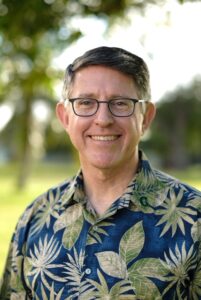How did you become interested in studying early American literature?

My earliest memories are from living at Fort Monroe, Virginia, from the ages of 3 to 7, when my father was stationed there as an army officer. Living in that historic, moated fort, and in close proximity to Jamestown, Williamsburg, and the whole Tidewater region sparked my lifelong interest in the early American period. Later, I did most of my growing up in the Virgin Islands, so that prompted my interest in the Caribbean and intersections between that region and North America.
Who is your favorite early American writer, or what is your favorite early American text, and why?
I’d have to say that James Grainger’s georgic, The Sugar Cane (1764), is the text that I’ve spent more time with than most any other—and it has long been the most notable literary text to come from the Caribbean in the early period—so I guess that qualifies it as my “favorite.”
What are you currently working on?
Because I’ve been living in Guam for almost four years now, I’ve developed an interest in writers from the early period who spent time in and wrote about both the Caribbean and the Pacific. The most prominent such figure is William Dampier, whose A New Voyage Around the World (1697) recounts his adventures as both pirate and proto-scientist. He was the first person to circumnavigate the globe three times, and he stopped in Guam on his first and third trips. He was also present when Alexander Selkirk (arguably the model for Robinson Crusoe) was marooned in the Juan Fernandez Islands and also when Selkirk was rescued in 1710. Both Dampier and Selkirk stopped in Guam on the way home to England.
What is something you are reading right now (EAL related or otherwise) that inspires you, either personally or professionally?
Hannah Holborn Gray’s memoir, An Academic Life (2018).
Is there a scholar in the field who inspires you, and why?
I’ve long been inspired by Nicole Aljoe and her work. She’s a leading figure not only in our early American field, but also in Caribbean, Atlantic, and the wider 17th- to 19th-century fields of literature, culture, and intellectual history. She’s been a mentor to many rising scholars, and she’s doing work across media, from manuscripts to various forms of new media.
Thomas Krise is President of University of Guam, where he is also Professor of English.
